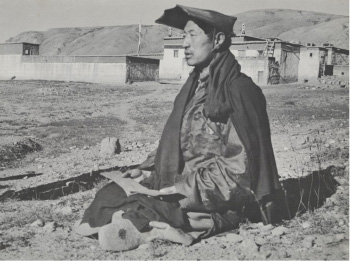This three-year project, which commenced in February 2008 and will end in March 2011, is funded by a grant for £150,256 from the Leverhulme Trust. It is one of a group of research projects which Geoffrey Samuel is developing at Cardiff based around Tibetan and other Asian medical traditions in Asian and Western contexts, exploring in particular healing techniques that encompass both mind and body therapies.

An international workshop, Contemporary Issues in the Anthropology of Tibetan Medicine, was held at St Michael's College, Llandaff on January 21 and 22, 2011 in connection with this project . The programme can be downloaded here.
Enquries to Geoffrey Samuel, Colin Millard or Dawn Collins.
Prof Geoffrey Samuel (Director)
Dr Colin Millard (Research Fellow)
Bon is a minority religious and cultural tradition that exists in Tibet alongside the majority tradition of Tibetan Buddhism. Our study focuses on the activities of an important recent Bon lama and medical scholar, Khyungtrul Jigmai Namkhai Dorje (1897-1955), and on the monastery, hospital and medical school that he and his principal student, the late Dr Tenzin Wangdak, founded near Mt Kailash in western Tibet.
The institutions which Khyungtrul founded offer unique opportunities to study a largely-unresearched branch of Tibetan medicine as taught and practiced in contemporary Tibet, as well as to investigate the interaction between Tibetan medicine and the contemporary Chinese health system in a remote rural setting.
The existence of Khyungtrul's three foundations, in an area that is deeply associated with the historic origins of Bon in Tibet, but from which the practice of Bon had virtually disappeared by Khyungtrul's time, also raises important issues regarding Bon identity and the role of medical and health practices in maintaining that identity.
Thus our research situation raises a series of interlocking questions regarding the teaching and practice of Bon medicine, the nature of Bon medicine and Bon identity in relation to Tibetan Buddhism, and the situation of Tibetan medicine in general in relation to the contemporary Chinese state.
The significance of the research lies in two main areas :
We hope that the understanding of these issues will lead in time to better and more productive use of the important resources for human health contained within traditional modes of healing such as Tibetan medicine.
The research involves a mixture of textual study and field research. Both Millard and Samuel are trained primarily in social and medical anthropology; both have also worked extensively with textual material. The textual component comprises detailed study of Tibetan medical texts, with consultation with Tibetan medical scholars where appropriate, and is aimed at identifying distinctive aspects of the Bonpo medical literature. The field research focusses on the use of these texts in medical training and practice, and the impact of the Chinese state health system on the hospital and medical school. It includes interviews of teachers and students associated with Khyungtrul and the Bonpo medical tradition, as well as interviews with patients and former patients in Tibetan medical facilities.
The outputs from the project will include the first Western book specifically on the Bon medical tradition, as well as a number of other edited books, book chapters and journal articles.